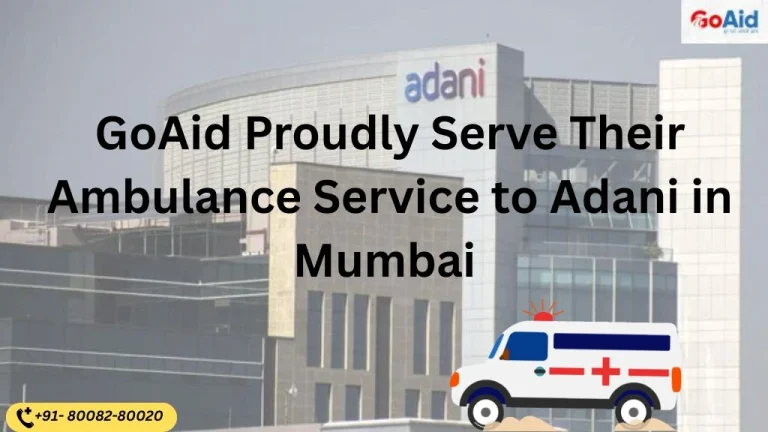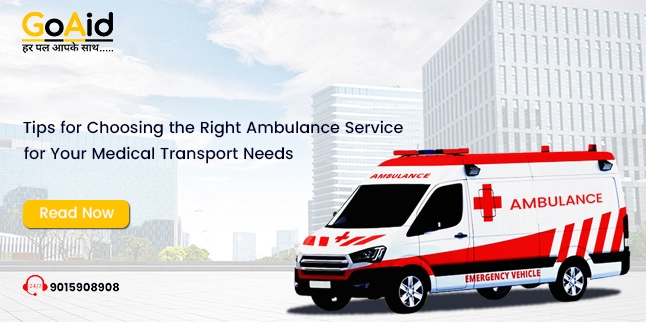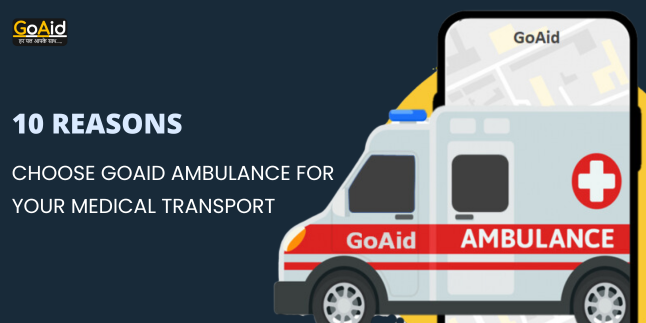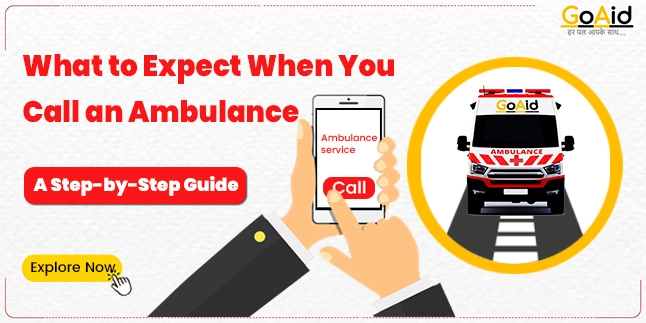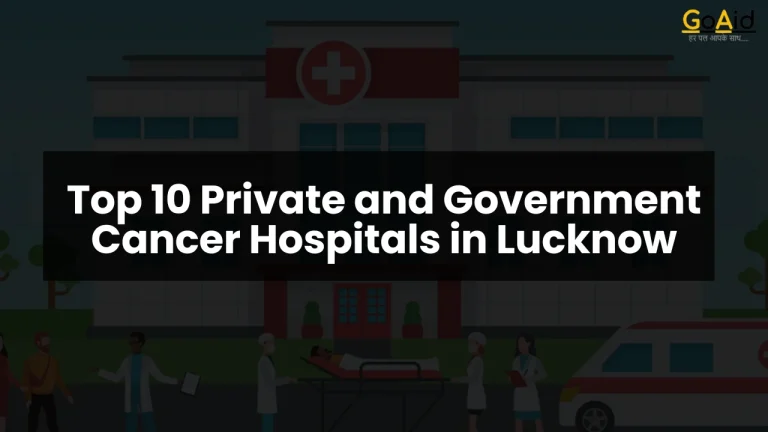The Importance of Ambulance Services: As an emergency vehicle, humans have invented a trustworthy innovation named ambulance service. This service helps people in their medical emergencies and helps them remain stable during critical transportation.
There are many benefits to different types of ambulance services in our surroundings. Knowing these benefits and the importance of ambulance services can help us increase our knowledge about the usefulness of ambulance services and their operations, which can make a significant difference in an ambulance service.
In this blog, we have added all the importance and benefits of an ambulance service that will help you increase your knowledge about ambulance services. This blog will be an educational resource that you can share with your family and friends. It’s your responsibility as a responsible citizen to share valuable educational content with those you know. So, let’s begin this educational journey.
The Importance of Ambulance Services: Saving Lives in Critical Moments
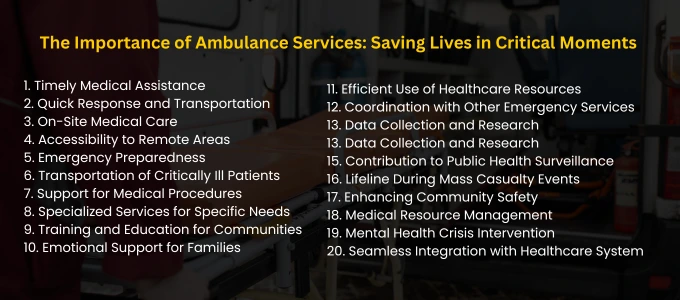
There is much importance to an Ambulance Service. Listing them all might not be worth reading. This is why we have listed some of the most popular and common importance of an Ambulance Service below:
1. Timely Medical Assistance
Ambulance services provide timely medical assistance in emergencies, ensuring that patients receive immediate care. They are equipped with essential medical equipment and staffed by trained professionals who can assess and stabilize the patient’s condition while en route to the hospital, potentially saving lives and improving outcomes.
2. Quick Response and Transportation
Ambulance services are designed for a rapid response to medical emergencies. They enable swift transportation of patients to healthcare facilities, minimizing delays and providing access to advanced medical care, particularly in time-sensitive situations such as heart attacks or strokes.
3. On-Site Medical Care
Ambulance services offer on-site medical care, providing crucial support in critical moments. Paramedics and emergency medical technicians can perform life-saving interventions and administer necessary treatments, stabilizing patients before they reach the hospital.
4. Accessibility to Remote Areas
Ambulance services play a vital role in providing healthcare access to remote and rural areas. They bridge the gap between isolated communities and healthcare facilities, ensuring that even those in hard-to-reach locations can receive urgent medical attention.
Also Read: Tips for Administering First Aid Before the Ambulance Arrives
5. Emergency Preparedness
Ambulance services enhance a community’s emergency preparedness by being readily available to respond to various incidents, including accidents, natural disasters, and mass casualty events. They are an integral part of the public health infrastructure, ready to provide medical support in times of crisis.
6. Transportation of Critically Ill Patients
Ambulance services are essential for the transportation of critically ill patients who require continuous monitoring and medical support. They facilitate transfers between healthcare facilities, ensuring that patients can access specialized care and treatments that may not be available locally.
7. Support for Medical Procedures
Ambulance services often assist with medical procedures that require transportation, such as organ transplants or patient transfers for specialized surgeries. They ensure that patients and medical resources are transported safely and efficiently.
8. Specialized Services for Specific Needs
Some ambulance services offer specialized services for patients with particular medical needs, such as neonatal or bariatric transport. These specialized ambulances are equipped with the necessary equipment and staff to cater to the unique requirements of these patient groups.
Also Read: Ambulance Response in Rural vs. Urban Areas: Bridging the Gap
9. Training and Education for Communities
Ambulance services often engage in community outreach and education, training individuals in basic first aid and CPR. This empowers communities to respond effectively to medical emergencies while awaiting professional medical assistance.
10. Emotional Support for Families
Ambulance services provide emotional support for families during medical emergencies. The presence of trained medical professionals offers reassurance to families that their loved ones are receiving immediate and appropriate care during critical moments.
11. Efficient Use of Healthcare Resources
Ambulance services contribute to the efficient use of healthcare resources by assessing and triaging patients at the scene. They ensure that patients are directed to the most appropriate level of care, helping to prevent overcrowding in emergency rooms.
12. Coordination with Other Emergency Services
Ambulance services work closely with other emergency services, such as fire and police departments, to ensure a coordinated response to incidents. This collaboration enhances the effectiveness of emergency management and improves patient outcomes.
Also Read: Can Ambulances Break Traffic Rules?
13. Data Collection and Research
Ambulance services collect valuable data on medical emergencies and patient outcomes, contributing to research efforts and quality improvement initiatives. This data helps healthcare professionals and policymakers make informed decisions to enhance the delivery of emergency medical care.
14. Support for Rural and Underserved Communities
Ambulance services are especially important for rural and underserved communities, where healthcare facilities may be scarce or distant. They ensure that these populations have access to emergency medical care, reducing disparities in healthcare access.
15. Contribution to Public Health Surveillance
Ambulance services play a role in public health surveillance by monitoring and reporting trends in medical emergencies, such as infectious disease outbreaks or drug overdoses. This information aids in the identification of public health threats and informs public health interventions.
16. Lifeline During Mass Casualty Events
Ambulance services are a critical lifeline during mass casualty events, such as natural disasters, terrorist attacks, or large-scale accidents. They provide rapid triage, medical care, and transportation of victims, helping to manage the situation and save lives.
Also Read: Top 10 Ambulance Service Providers in Delhi
17. Enhancing Community Safety
Ambulance services contribute to community safety by providing rapid medical intervention during accidents or incidents. This presence not only aids the individuals involved but also reassures the community that help is readily available in times of need.
18. Medical Resource Management
Ambulance services manage and transport essential medical resources, such as blood, organs, or medical equipment, ensuring they reach their destination promptly. This efficient resource management is crucial for medical procedures and patient care.
19. Mental Health Crisis Intervention
Ambulance services often respond to mental health crises, providing immediate support and transport to appropriate care facilities. The trained personnel can assess and de-escalate the situation while ensuring the individual’s safety.
20. Seamless Integration with Healthcare System
Ambulance services are an integral part of the healthcare system, providing a seamless link between pre-hospital and in-hospital care. This integration ensures continuity of care and better coordination of services, ultimately benefiting the patient’s overall health outcome.
Conclusion: The Importance of Ambulance Services
In critical moments, the importance of ambulance services cannot be overstated. Rapid response is often the difference between life and death. Choosing a reliable service like GoAid Ambulance can be a life-saving decision. Their prompt services in Jaipur | Mumbai | Hisar | Noida | Delhi | Kolkata | Patna, and more ensure that help reaches your doorstep within 10 minutes. Whether it’s a medical emergency or a timely transport requirement, GoAid Ambulance Service stands as a beacon of hope. The value of quick and efficient ambulance services extends beyond convenience; it’s a lifeline, ensuring that precious moments are not lost when every second counts.









